Film Name: 中国乒乓之绝地反击 / Ping-pong of China / Ping Pong: The Triumph
Among the seven films in this year’s Spring Festival, Ping-pong of China (hereinafter referred to as “Ping-pong of China”) is the most “dramatic”: it was the latest film to be scheduled, the earliest to be screened, quickly withdrawn and renamed, postponed to the third day of the Lunar New Year, and then withdrawn again in two days, and rescheduled to 17 February. 17th, in the meantime has been maintained a small-scale point of view screenings ……
I just took the opportunity of the recent screening to see the film, given that Deng Chao and Yu Bai Mei, the pair has been in the past the whole bad work, so I did not hold much expectation, but it turned out that the film is not bad, at least it is a handful of “line work”.
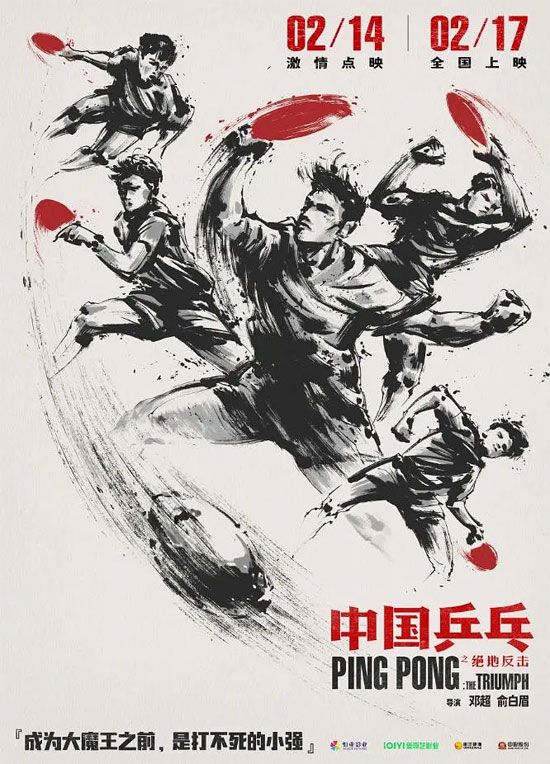
If my assessment of the writers and directors’ last film Looking Up was that it was “a big improvement, but there’s still a lot of room for improvement,” then Ping-pong of China is “not a big deal, but it’s just not that good! It’s just that it’s not that good.”
It should be said that the fact that this film has a good standard above the passing line and can be watched smoothly by the audience is to a certain extent due to the mature and stable storytelling template of sports/athletic films, but at the same time, its “ceiling” is also very clear, and many of its limitations are not only the embarrassment of domestic sports films, but also reflect some of the dilemmas of the sport itself. Many limitations are not only the embarrassment of domestic sports films, but also reflect some of the dilemmas of the sport itself.
[Friendly reminder: there will be spoilers below].
The first thing that must be acknowledged is that Ping-pong of China is a well-set, well-paced sports film that takes what it takes.
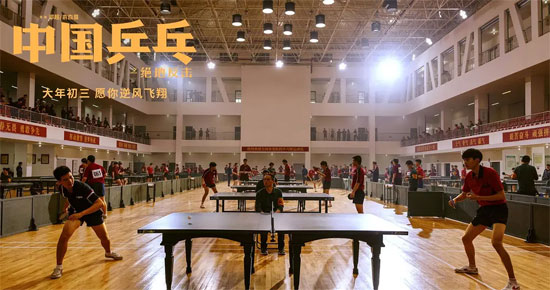
The film is based on the true story of the Chinese men’s ping pong team in the early 1990s, when the team lost many battles against strong European teams. Cai Zhenhua, the young coach, gave up his high-paying position in Italy to return to China to coach the national ping pong team, and boldly set up a new team, which eventually regained the Svensk Große Cup in 1995 after four years of hard training.
Just looking at the background of this story, it is enough to write a “cool article”, and the film in fact follows the same but tried-and-true formula:
At the beginning of the film, everyone is questioning the national team’s “no longer magnificent”, Dai Minjia returned to his country for the sake of his feelings, and was appointed as the head coach of the national team, who did not stick to any particular style of talent, and had ups and downs in the selection of personnel, training, bonding and choice of strategies, including the inspiring victory in the Korea Invitational Tournament, and the downturn in the 1993 Gothenburg defeat. The national team overcame the hardships and dangers to beat Sweden in the final of the Tianjin World Series, returning to the top after eight years.
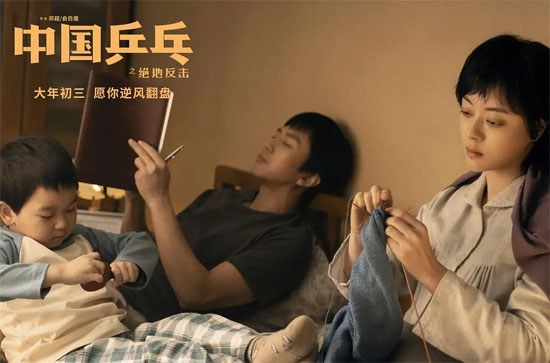
In addition to the richness of the main story, Ping-pong of China also spices up the character strands, such as the wife Wang Ying’s followership, disbelief, encouragement and support of her husband, Chen Wen’s aggression towards being a chaperone, and his loss of control before and after leaving the team, etc. The film also offers some interesting audio-visual effects, such as several parts of the soundtrack that sound like a table tennis accompaniment.
Meanwhile, the audiovisual effects provided by the film are also remarkable, for example, several parts of the soundtrack can be heard as ping-pong accompaniment, which is apt and magical, and the theme song “No One Calls “Hey”” is also tailor-made for the film, from the lyrics to the melody are very much in the spirit of athletic sports against the odds.
In terms of scenes, images and technical details, the film tries its best to restore the style of 30 years ago. Although the speed of table tennis itself is difficult to be shown visually, the power, rotation, racket switching, body position and other qualities can be strengthened through editing and close-ups, which is not a waste of the film’s “writing reality in a false sense”. It’s not a waste of film’s “writing reality in the form of emptiness”.
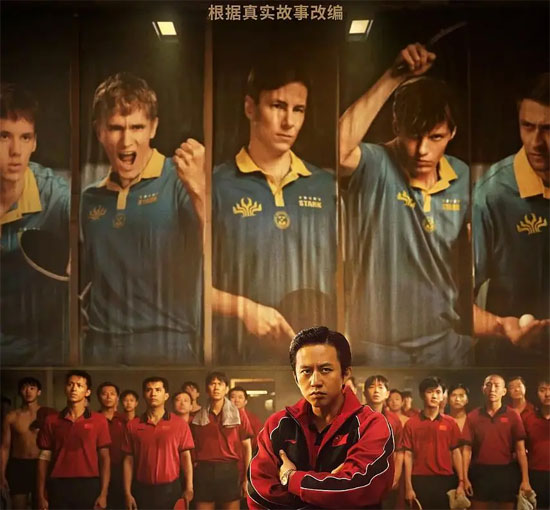
In addition, if you are a fan of the Chinese table tennis team, especially if you are familiar with that period of history, you will have more fun watching this film, such as Sweden’s postage stamps, Dai Minjia’s taking of Bai Minhe Liwei, sending players to European clubs to “steal from the masters”, the head coach’s back injuries, and so on, all of them have realistic prototypes, especially that sentence “The officer was scolded by the non-officer, this is the life of the officer.” Not to mention 30 years ago, it holds true now.
However, even if “Ping-pong of China” gets all the basic scores within the required actions, and even completes them well, it can’t be called a good and impressive film, because apart from the above mentioned parts that should be done, it is hard to find other merits.
As the saying goes, “success is also about the subject matter, but failure is also about the subject matter”. Although Deng Chao and Yu Baimei have taken advantage of the inherent strengths of sports cinema to make a film of moderate quality, they also have to accept the side effects of this type of film that the ceiling is not high, it is difficult to break through, and the audience is relatively small.
What’s worse, Ping-pong of China didn’t get any of the three waves of “sentimentality” it wanted.
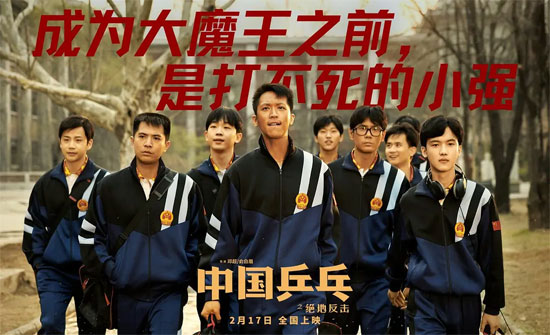
Firstly, it didn’t get a stand-up endorsement from the national team as well as people in the circle.
Note that Deng Chao played Dai Minjia, the prototype is Cai Zhenhua;
Xu Weizhou played Bai Minhe, the role was called Ma Wenhe, the prototype is Ma Wenge;
Duan Bowen as Huang Zhao, the character was called Huang Tao, the prototype is Wang Tao;
Cai Yida as Gong Feng, the character was called Ding Feng, the prototype is Ding Song;
Ding Guansen as Hou Zhuoxiang, the character’s name was Liu Guoliang, the prototype was Liu Guoliang;
Sun Xilun as Dong Shuai, the character was originally called Kong Shuai, the prototype was Kong Linghui ……
From the harmonic name to change all the names, this is a very obvious signal, the same as the sports film, “Leap” also went through many twists and turns, but at least they invited many female volleyball players to star in the real name, the official also down to help promote the momentum, compared to “Ping-pong of China” did not get any upscale resources to support, this is not the “national ball”. This is not the treatment that a “national ball game” film deserves, and it shouldn’t be hard to figure out why.
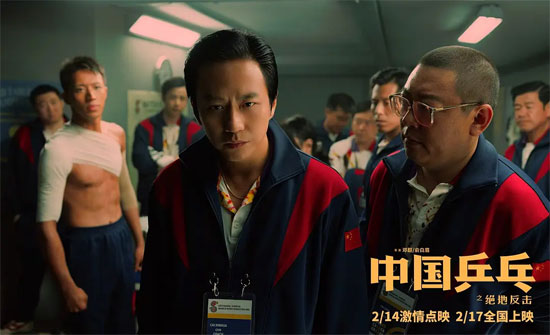
Secondly, the public’s love and support for table tennis is far from high.
Sports films are niche, but I’m afraid the audience for table tennis is even more embarrassing in comparison. Although we have the best team in the world, and have won countless trophies and honours over the years, and there are a lot of viewers who pay attention to the Olympics and the World Series, the reality is that table tennis is a short-lived popularity among the public, and then quickly dwindles, and there aren’t a lot of real fans (in fact, it’s pretty much the same for all sports!). The reality is that ping pong is not a sport with many real fans (all sports are pretty much the same), so “fans on top of fans” just doesn’t scale.
Thirdly, the audience is already tired of melodramatic films with similar creative ideas.
Commercial genre + melodramatic films have appeared frequently in recent years, and there are indeed some fine films, but there are also many bad films that use the “correct theme” to make money, which has led to a rapid increase in the corresponding requirements, and it’s hard to be recognised for not having some real material. To be fair, Ping-pong of China is in the middle of the pack, but the landscape has changed.
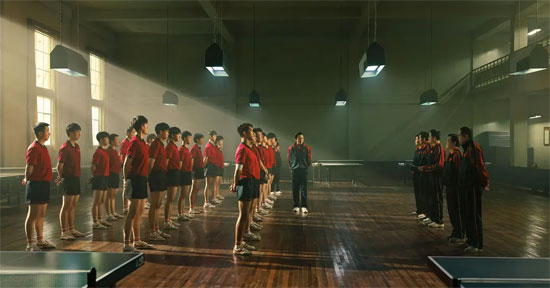
Not to mention, of the other six films in this year’s Spring Festival, apart from Five Hundred Miles, the remaining five are all more capable than Ping-pong of China, so it’s no wonder that it has to be a deserter. ……
Even if Ping-pong of China is a qualified and watchable sports film, I’m afraid it won’t be able to do much at the box office – the creators won and lost at the same time, which may be the best depiction of the saying, “Time and destiny are the same. “That’s probably the best way to describe it.
Please specify:Anime Phone Cases » Ping-pong of China 2023 Film Review: Trapped Victory